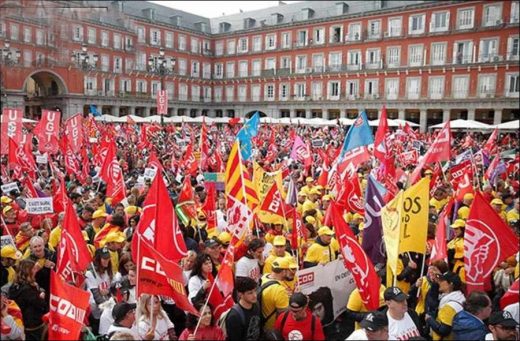The current state of the European radical left after 1989. The fall of the Berlin Wall in 1989 profoundly changed the political atmosphere of Europe. Capitalist restoration, driven by structural political upheavals and major economic transformations, had social repercussions on a global scale. In Europe, the sphere of influence of anti-capitalist forces inevitably narrowed: Their ability to organize and direct social struggles gradually weakened, and the left lost its ideological hegemony, which had an important place in many national cultures after 1968.
This regression also showed itself in the election arena. Parties united around Eurocommunism since the 1980s also lost significant support in politics with close ties to Moscow and turned into a real wreck with the collapse of the USSR.
Then, a process of restructuring began and new political formations formed around the anti-capitalist elements in the current situation emerged. This caused traditional structures on the left to open themselves to the ecology, feminism and peace movements that had developed in the previous decade. Izuierda Unida, founded in Spain in 1986, was the pioneer of this transformation.
Similar initiatives occurred in Italy and Greece with the establishment of the Communist Reestablishment Party and Synaspismos in 1991. In other countries, this transformation emerged as an effort (albeit only in appearance in some) to renew themselves by parties dating back to before the fall of the Berlin Wall: The Socialist Unity Party, which had been in power in the East German Republic since 1949, changed its name to the Party of Democratic Socialism.
Transformation of what remains of social democracy
These new parties, along with those that did not change their names, managed to gain a political presence at the national level. Together with social movements and progressive union forces, they existed in the developing resistance against the neoliberal policies brought by the Maastricht Treaty of 1993, which imposed strict monetary restrictions on new EU member states. In 1994, they founded a group in the European Parliament called the European Left Union.
In the mid-1990s, the enthusiasm created by strikes and mass actions against the governments of their countries (Berlusconi in Italy, Juppé in France, Gonzalez and Aznar in Spain) even brought modest electoral victories to some forces within the radical left. Izquierda Unida received 13.4% of the votes in the 1994 EP elections, the Italian Communist Reestablishment Party received 8.5% in the 1996 general elections, and the French Communist Party received approximately 10% in the parliamentary elections.
At the dawn of the new century, a huge, politically heterogeneous wave of struggle against neoliberal globalization was spreading throughout the world. Mass protests at the G8 and IMF summits, together with the World Social Forum founded in Brazil in 2001, encouraged broad discussion of alternatives to dominant politics.
On the other hand, the breakthrough achieved by Tony Blair in England opened the door to a radical departure from the ideology and program of the Socialist International. Supported by many European countries in different ways; Blair’s “Third Way” was nothing more than a passive acceptance of the neoliberal maxim, covered up with empty praises of the “new”.
In Europe, the remnants of the social welfare era were falling apart one by one: attacks on the pension system, a new era of large-scale privatization, marketization of education, cuts in R&D funding and a lack of effective industrial policies. Similar political choices also influenced Eastern Europe.
In terms of economic management, there were minimal differences between the policies of the social democratic and conservative parties in power at the time. So much so that, in many cases, social democratic or center-left governments have been much more successful in carrying out the neoliberal project, especially with the unions’ acceptance of their old delusions that they will be approached more friendly. Their foreign policy orientations also involved a similar break with the past (as seen in NATO’s bombing of Kosovo, the Iraq war and the military intervention in Afghanistan).
Mistakes during the ruling period
Although socialist parties often adopted the issue of ecology as a principle, they almost never passed effective laws to solve important environmental problems. This was also influenced by the fact that most of the Green Parties came to a moderate line, stopped distinguishing between left and right when choosing allies, and gave up their post-ideological orientation and struggle with the current mode of production.
This change in European social democracy, which included unconditional obedience to all the principles of capitalism and neoliberalism, showed that 1989 shook not only the communists but all progressive forces. Social democrats, II. He abandoned reformism and state intervention in the economy, which were his characteristics after World War II.
Despite all these radical changes, many parties within the European radical left made alliances with social democratic forces. The fact that the neoliberal wind blew unopposed in the absence of mass social movements that would push the governments towards a socialist line had a negative result for the radical left parties. The anti-capitalist left has failed to achieve any social gains that would shake the most basic economic principles; All its achievements have been periodic, weak and palliative.
Often they had to acquiesce and support economic measures to which they had promised they would not compromise. Yet the election results were disastrous everywhere. In the 2007 presidential election, French communists received less than 2 percent of the vote, and the next year Izquierda Unida bottomed out with 3.8 percent. In Italy, communists could not enter the parliament for the first time in the history of the republic, receiving 3.1 percent of the votes.
Views: 169



